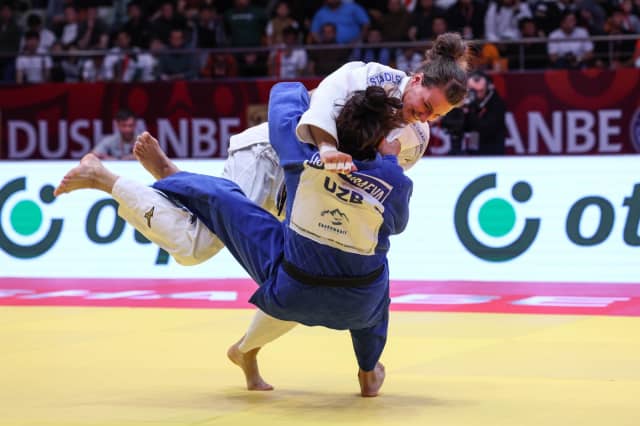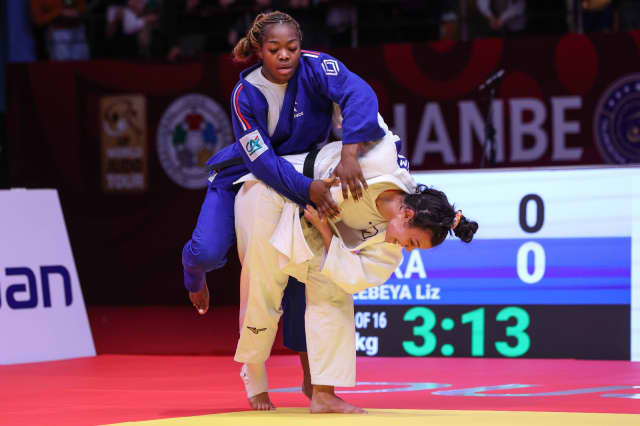Lanir (ISR), Wagner (GER), Tcheumeo (FRA), Malonga (FRA), Aguiar (BRA), Umeki (JPN) and Hamada (JPN) are all qualified for the Games, are all still fighting and have all been world champion. Hamada has the Olympic title too. These names are listed before we even get to those holding Olympic and world medals of other colours: Powell (GBR), Ma (CHN), Bellandi (ITA) and more. The quality of the group is unreal and in Dushanbe, of course, it has been intense, even without them all present.
Wagner topped the Dushanbe Grand Slam -78 kg table as number three in the world, while her teammate Alina Boehm came in as the number 2 seed, promising the packed crowd at the Kasri Tennis Arena an immense final. They were not disappointed!
Wagner had the only bye in the category, earned by way of her results and rank. She then beat Kurbanbaeva (UZB) in one of the most swift and dominant victories of the tournament, throwing with uchi-mata to o-uchi-gari in a matter of seconds.
The german supremacy in the -78kg continues! 🇩🇪
— Judo (@Judo) May 5, 2024
Follow all the action on https://t.co/5YYXyE0nko 💻#JudoDushanbe #Judo #Dushanbe #Tajikistan #Sport #Olympics #OlympicQualifiers #RoadToParis2024 #WJT #Icona pic.twitter.com/SfuC4T6Syg
In pool B the British pairing of Reid and Powell suffered due to their seeding, the former as 4th seed and the latter in at 5th, putting them in the same quarter, leaving no route to the final for at least one of them even if they could pass the German duo. Reid won her first contest and Powell won hers, knocking Prodan (CRO) and Kantavaya (AIN) out, ahead of a quarter-final showdown which could be decisive in the race to Paris.
Like Wagner, Boehm’s power was at full mast. She dispatched Ngelebaya (FRA) in less than a minute with a huge koshi-waza and then held Babibtseva (AIN) for ippon in their quarter-final before having a little more trouble with Sampaio (POR), a shime-waza providing the win deep into golden score, an important win indeed.
Boehm met Wagner in the final after Wagner’s trademark uchi-mata put paid to Powell’s hopes of a place in the final. Powell looked to be on good form though and would be a tough challenge for anyone in a fight for bronze, especially with the British Olympic team selection still up in the air.
The final block was set to be incredibly tense for both Germany and Great Britain. The bronze medal contests were lined up: Reid vs Sampaio and Pacut-Kloczko (POL) vs Powell.
On paper the first bronze medal may have been expected by the Portuguese team but Reid refused to give it up, throwing Sampaio with o-uchi-gari and holding on with some mentally resilient judo. This is Reid’s first grand slam medal inside the qualification period and it couldn’t have come at a better time for her.
The second bronze medal was won by the Polish fighter. Pacut-Kloczko worked her way into a leading position, forcing two penalties against Powell before throwing her too. This will be a big disappointment for Powell who now sees Reid widen the gap and with only two opportunities left to close it. Pacut-Kloczko takes bronze and offered a huge smile, a fourth grand slam medal of her career.
The final for Germany mirrored the effect of the bronze medal contest for the British team with Wagner widening the gap between her and Boehm. It was a win on penalties, none given to Wagner who dominated every exchange, unmoved by Boehm’s seoi-otoshi attacks.





